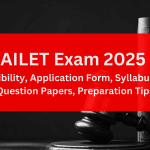The Common Law Admission Test (CLAT) remains one of the most prestigious and competitive entrance exams for law aspirants in India. Conducted by the Consortium of National Law Universities (NLUs), CLAT is the gateway to 22 renowned NLUs and numerous private law schools.
1. Important Dates for CLAT 2025
The CLAT 2025 exam date is generally announced several months in advance, and the registration process typically begins in August or September the year before. Here’s the expected timeline for CLAT 2025:
- Application Start Date: August/September 2024
- Application Deadline: November 2024
- Admit Card Release: Early December 2024
- Exam Date: 1 December 2024
- Result Announcement: January 2025
- Counseling Process: January-February 2025
It’s essential to regularly check the Consortium of NLUs’ official website for updates, as dates may vary. Missing any deadlines could mean missing the opportunity to appear for this competitive exam, so staying informed is key.
2. CLAT 2025 Exam Structure
The CLAT exam pattern has seen changes in recent years, focusing on testing the comprehension and analytical skills of students. Here’s an overview of the exam pattern:
- Type of Exam: Offline, Pen and Paper mode
- Duration: 2 hours (120 minutes)
- Total Questions: 150 (UG) / 120 (PG)
- Question Type: Objective, Multiple-Choice Questions (MCQs)
- Marking Scheme: +1 for each correct answer, -0.25 for each incorrect answer
The structure is designed to assess understanding rather than rote memorization. This change has made reading comprehension and reasoning skills a high priority for CLAT preparation.
3. CLAT 2025 Syllabus
The CLAT syllabus covers various topics aimed at evaluating a candidate’s aptitude in areas relevant to law and general knowledge. Here’s a breakdown of each section:
a. English Language
- This section tests reading comprehension and language skills. Passages are drawn from fiction and non-fiction, and questions focus on vocabulary, grammar, and understanding of the text.
- Topics to Cover: Reading Comprehension, Vocabulary, Grammar, Sentence Correction, Idioms, and Phrases.
b. Current Affairs, including General Knowledge
- Knowledge of current events and an understanding of general knowledge form the foundation of this section.
- Topics to Cover: Important national and international events, government schemes, awards, sports events, historical events, and significant legal developments.
c. Legal Reasoning
- This section evaluates your ability to understand and apply legal principles to given scenarios. Basic legal awareness is beneficial, though a law background is not mandatory.
- Topics to Cover: Principles of law, torts, contracts, criminal law basics, and case facts analysis.
d. Logical Reasoning
- Designed to test your analytical and critical thinking skills, this section involves arguments, premises, and conclusions.
- Topics to Cover: Statement and assumptions, syllogisms, logical sequences, analogies, and argument analysis.
e. Quantitative Techniques
- Quantitative aptitude, involving numerical and data interpretation questions, is part of the test. The questions are based on Class 10-level mathematics.
- Topics to Cover: Ratios, percentages, averages, profit and loss, time and work, algebra, and statistical data interpretation.
4. Eligibility Criteria for CLAT 2025
Eligibility criteria differ slightly for undergraduate (UG) and postgraduate (PG) applicants.
For Undergraduate Program (UG):
- Educational Qualification: Completion of Class 12 or an equivalent examination with a minimum of 45% marks (40% for SC/ST candidates).
- Age Limit: No upper age limit.
- Appearing Candidates: Candidates appearing in their Class 12 exams are also eligible to apply.
For Postgraduate Program (PG):
- Educational Qualification: LL.B. or equivalent degree with at least 50% marks (45% for SC/ST candidates).
- Age Limit: No age restrictions.
- Appearing Candidates: Candidates in their final year of LL.B. are eligible to apply.
Ensure that you meet the eligibility criteria before applying, as the application fee is non-refundable.
5. Registration Process for CLAT 2025
The CLAT registration process is straightforward and entirely online. Here are the steps to follow:
- Visit the Official Website: Go to consortiumofnlus.ac.in and locate the CLAT 2025 registration link.
- Create an Account: Register with a valid email ID and mobile number. This will be your unique ID for all CLAT-related correspondence.
- Complete the Application Form: Fill out the application form, providing personal details, educational qualifications, and test center preferences.
- Upload Documents: You’ll need to upload a recent passport-sized photograph, signature, and category certificate (if applicable).
- Pay the Application Fee: Fees vary; the general fee is usually around INR 4,000, with a discounted rate for SC/ST candidates.
- Submit and Save the Form: Double-check the details, submit the application, and save a copy for future reference.
6. Tips for CLAT 2025 Preparation
Preparation for CLAT requires a blend of strategy, consistent practice, and time management. Here are some tips to help you ace the exam:
- Start Early: CLAT preparation needs a minimum of 6-8 months for consistent practice. Start early to cover the syllabus thoroughly.
- Focus on Reading: Since CLAT now emphasizes comprehension-based questions, read newspapers, editorials, and legal magazines regularly.
- Practice Mock Tests: Mock tests simulate the actual exam and help you build time management skills. Aim to attempt at least 1-2 mock tests weekly.
- Analyze Previous Years’ Papers: Familiarize yourself with the question types and exam pattern by analyzing previous years’ question papers.
- Work on Weak Areas: Identify your weaker sections through mock tests and dedicate extra time to strengthening them.
- Stay Updated with Current Affairs: Make a habit of reading the news daily to stay informed on current affairs, particularly legal and political developments.
7. Important Resources for CLAT Preparation
Quality resources make a significant difference in CLAT preparation. Here are some recommended resources:
- Books: Word Power Made Easy (for Vocabulary), Quantitative Aptitude by RS Aggarwal, Legal Aptitude for CLAT and Other Law Entrance Examinations by AP Bhardwaj.
- Mock Tests: Consortium official mocks and private coaching institute mock tests are helpful for regular practice.
- Online Portals: Websites and apps offering CLAT-specific content and mock tests can help sharpen your skills.
- Newspapers: The Hindu, The Indian Express, and the Times of India for current affairs and editorials.
8. How to Approach Exam Day
With the exam day approaching, it’s essential to have a game plan to manage time and anxiety effectively:
- Read Questions Carefully: Take time to read each question carefully to avoid misunderstandings or misinterpretations.
- Prioritize Easy Questions: Answer questions that you’re confident about first, then move to more challenging ones.
- Manage Time Wisely: Divide your time per section, keeping buffer minutes at the end to review answers.
- Stay Calm: Anxiety is natural but can be managed. Take deep breaths, stay positive, and remember the preparation you’ve put in.
Conclusion
The CLAT exam is undoubtedly challenging but absolutely achievable with the right approach. By familiarizing yourself with the exam pattern, syllabus, and eligibility criteria and planning an effective preparation strategy, you can take on CLAT 2025 with confidence.
Remember, consistency and a clear focus are your best allies. Best of luck on your journey to a career in law!



